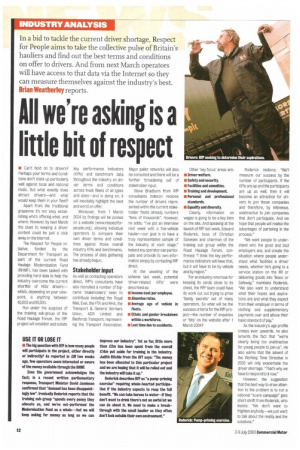All we're asking is a little bit of respect
Page 12

If you've noticed an error in this article please click here to report it so we can fix it.
In a bid to tackle the current driver shortage, Respect for People aims to take the collective pulse of Britain's hauliers and find out the best terms and conditions on offer to drivers. And from next March operators will have access to that data via the Internet so they can measure themselves against the industry's best. Brian Weatherley reports.
• Can't hold on to drivers? Perhaps your terms and conditions don't stack up particularly well against local and national rivals. But what exactly does attract drivers—and what would keep them in your fleet?
Apart from the traditional grapevine it's not easy establishing who's offering what. and where. However, by next March the clues to keeping a driver content could be just a click away on the Internet.
The Respect for People ini tiative, funded by the Department for Transport as part of the current Road Haulage Modernisation Fund (RHMF), has been tasked with providing hard data to help the industry overcome the current shortfall of HGV drivers— which, depending on your viewpoint, is anything between 40,000 and 80,000.
Run under the auspices of the training sub-group of the Road Haulage Forum, the RtP project will establish and collate key performance indicators (KP15) and benchmark data throughout the industry on driver terms and conditions across truck fleets of all types and sizes—and in doing so, it will inevitably highlight the best and worst on offer.
Moreover, from 1 March 2004 its findings will be posted on a website (www.respectforpeople.org), allowing individual operators to compare their own driver terms and conditions against those overall industry KPIs and benchmarks. The process of data gathering has already begun.
Stakeholder input
As well as contacting operators direct, RfP's consultants have also recruited a number of bigname 'stakeholders' keen to contribute including the Royal Mail, Exel, the FTA and RHA, the Transport & General Workers Union, ADR Limited and Bedfords Transport, representing the Transport Association. Major pallet networks will also be consulted and there will be a further 'broadening out' of stakeholder input.
Steve Bradburn from RP consultants Indecon reckons the number of drivers represented within the current stakeholder fleets already numbers "tens of thousands". However, he adds, "I've got an interview next week with a five-vehicle haulier—our goal is to have a truly representative sample of the industry at each stage." Indeed any operator can participate and provide its own information simply by contacting RP direct.
At the unveiling of the scheme last week, potential 'driver-related KPIs' were described as: • Income/cost per employee.
• Absentee rates.
• Average age of vehicle in fleets.
III Ethnic and gender breakdown within a workforce.
• Lost time due to accidents. Other 'key focus' areas are: • Driver welfare.
• Safety and security.
• Facilities and amenities.
• Training and development.
• Personal and professional standards.
• Equality and diversity.
Clearly, information on wages is going to be a key item on the site. And speaking at the launch of RIP last week, Edward Roderick, boss of Christian Safvesen and chairman of the training sub group within the Road Haulage Forum, confirmed: "I think the key performance indicators will have that, but it will have to be by vehicle and by region."
For an industry notorious for keeping its cards close to its chest, the RIP team could have its work cut out trying to prise 'family secrets' out of many operators. So what will be the success criteria for the RIP project—the number of enquiries or 'hits' on the website after 1 March 2004? Roderick reckons: "We'll measure our success by the number of participants. If the KPIs are up and the participants are up as well, then it will become an attraction for drivers to join those companies and therefore, by inference, unattractive to join companies that don't participate. And we hope that people will realise the advantages of partaking in the process."
'We want people to understand who the good and bad employers are, and create the situation where people understand what facilities a driver needs, whether he's going to a service station on the M1 or delivering goods into Tesco or Safeway," maintains Roderick. "We also want to understand what their hopes and aspirations are and what they expect from their employer in terms of clothing and supplementary payments over and above their basic standard of pay."
As the industry's age profile creeps ever upwards, he also laments the fact that "we're clearly being too unattractive for young people to join us". He also warns that the advent of the Working Time Directive in 2005 will only exacerbate the driver shortage. "That's why we have to respond to it now."
However, the suggestion that the best way to draw attention to the problem is to run a national "scare campaign" gets short shrift from Roderick, who insists: 'We don't want to frighten anybody—we just want to talk about the reality and the solutions."




































































































































































